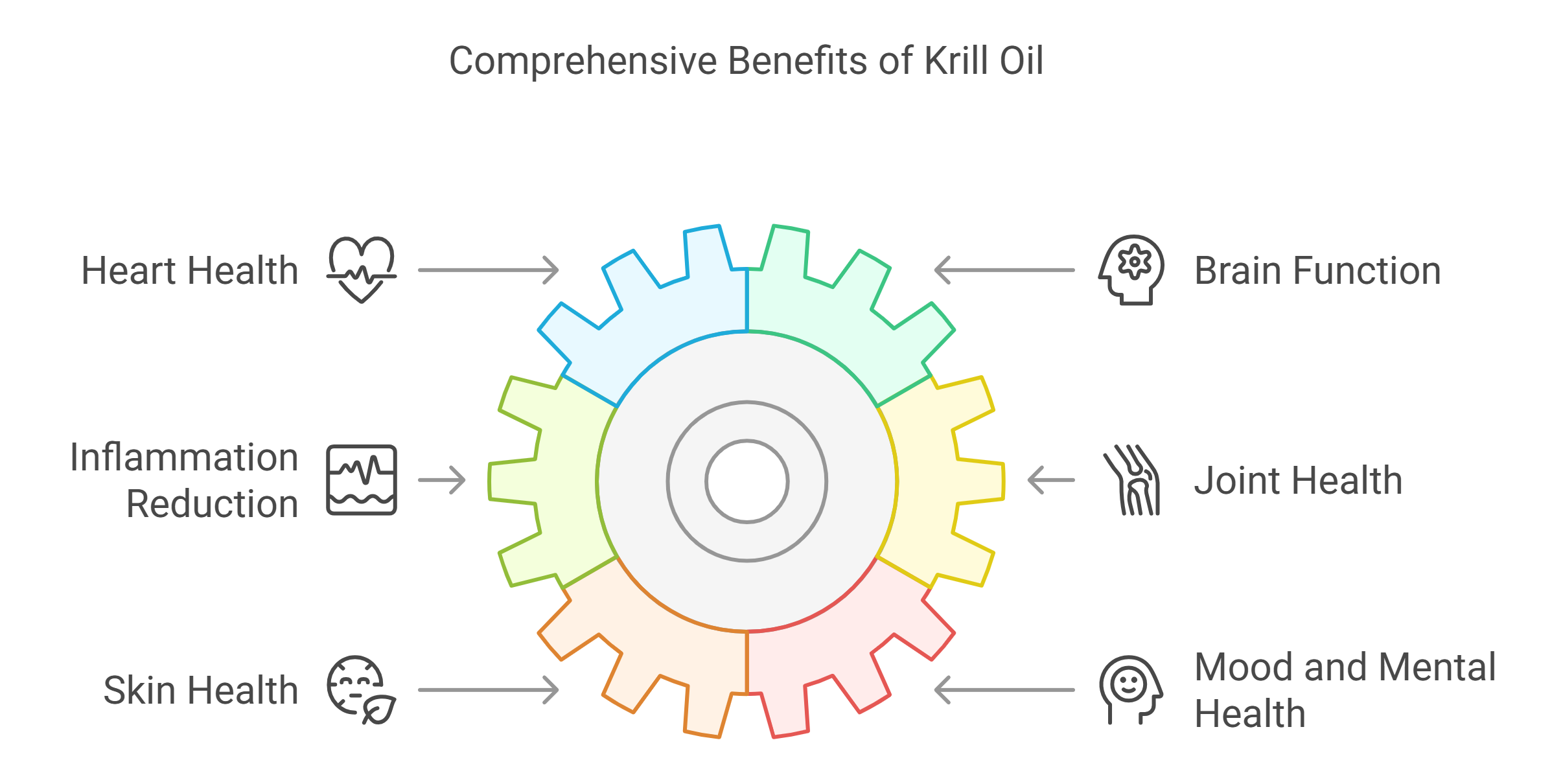Krill oil, a nutritional supplement derived from a small crustacean called “krill,” has gained popularity due to its potential health benefits. This oil benefits heart health, cognitive function, and inflammation reduction. If you consider adding krill oil to your daily routine, you might wonder about the recommended dosage.
In this comprehensive guide, I will explain how much krill oil should I take for optimal health benefits. I’ll also provide detailed information on the recommended dosages, the factors influencing your dosage needs, and the potential health benefits associated with krill oil. By the end of this guide, you will better understand how much krill oil to take to experience its health benefits.
Krill Oil
Krill oil is rich in essential omega-3 fatty acids, like eicosapentaenoic acid (EPA) and docosahexaenoic acid (DHA), which are important for good health. These fatty acids in krill oil help to reduce inflammation, improve heart health, and boost brain function.
Additionally, krill oil contains a potent antioxidant called astaxanthin, which has been shown to provide numerous health benefits, including supporting healthy skin and eyes, boosting immune function, and reducing oxidative stress. Krill oil is an ideal supplement for those interested in naturally augmenting their overall health and wellness.
How Much Krill Oil Should I Take?
The appropriate krill oil dosage can vary depending on your health goals, age, weight, and overall health. However, there are general guidelines to consider:
General Health and Maintenance
A daily dose of 250-500 milligrams (mg) of krill oil, providing approximately 50-100 mg of EPA and DHA combined, is typically recommended for overall health and well-being. This dosage can help support cardiovascular health, reduce inflammation, and promote brain function.
Children can also benefit from krill oil supplementation, typically at lower doses. Dosages for children can range from 50-200 mg of krill oil, depending on age and individual health needs.
Specific Health Conditions
You may benefit from higher doses of krill oil if you have particular health concerns, such as high cholesterol, inflammation, or joint pain. Consult with your doctor for personalized recommendations.
Factors Influencing Krill Oil Dosage
Several factors can influence the appropriate krill oil dosage for an individual:
- Body Weight: Individuals with more body weight may require higher doses to achieve health benefits. 1-1.5 grams of krill oil per 100 pounds of body weight can be a starting point.
- Health Goals: The reason for taking krill oil has a significant role in determining the dosage. Those seeking to manage specific health conditions may require higher doses than individuals using it for general health maintenance.
- Age: Age can impact your omega-3 needs. Children and the elderly may require different dosages to optimize health benefits.
- Dietary Intake: If you already consume an omega-3 fatty acid-rich diet from sources like fatty fish (e.g., salmon, mackerel), your supplementation needs may be lower.
- Health Conditions: If you have existing health conditions, visit healthcare to determine the appropriate krill oil dosage. Conditions like high cholesterol, arthritis, or cognitive decline may require tailored supplementation.
Potential Health Benefits of Krill Oil
Krill, compared to fish, has high properties of omega-3 fatty acids, phospholipids, and antioxidants. Its unique composition and structure make it more bioavailable and effective than other marine oils. Here, I’ve mentioned some of the most common benefits of krill oil:
- Heart Health: Krill oil’s omega-3 fatty acids, particularly EPA and DHA, can help reduce triglycerides, lower blood pressure, and improve overall heart health. Regular consumption of krill oil decreases the risk of heart disease.
- Brain Function: The omega-3s in krill oil are essential for brain health. They can enhance cognitive function, improve memory, and potentially reduce the risk of neurodegenerative diseases like Alzheimer’s.
- Inflammation Reduction: Krill oil’s anti-inflammatory properties, combined with astaxanthin’s antioxidant effects, may help reduce inflammation throughout the body, benefiting those with conditions like arthritis.
- Joint Health: Krill oil’s omega-3s can reduce joint pain and stiffness, making it a potential supplement for individuals with osteoarthritis or rheumatoid arthritis.
- Skin Health: Astaxanthin in krill oil promotes healthy skin by protecting it from the damaging effects of UV radiation and oxidative stress.
- Mood and Mental Health: Omega-3s in krill oil may support mental well-being by improving mood and reducing symptoms of depression and anxiety.
Safety and Side Effects
Krill oil is generally considered safe for most individuals when taken at recommended dosages. However, potential side effects may include gastrointestinal discomfort, loose stools, or fishy aftertaste. To minimize these effects, consider adding krill recipes to your diet. If you have allergies to shellfish, consult with a healthcare professional before using krill oil, as it may trigger an allergic reaction.
Conclusion
Determining the right krill oil dosage for your needs involves considering various factors, including your health goals, body weight, and age. A daily dose of 250-500 mg is often recommended for general health maintenance. However, those with specific health concerns or conditions may require higher doses. Consult your healthcare professional before taking krill oil. Finding the right dosage is key to reaping its benefits.
Frequently Asked Questions
Can I Take Krill Oil If I’m Allergic To Shellfish?
Since krill are crustaceans, individuals with shellfish allergies should avoid krill oil or proceed with caution. Consult a healthcare provider before starting krill oil if you have a shellfish allergy.
How Long Does It Take To See The Benefits Of Taking Krill Oil?
The timeframe for noticing the benefits of krill oil can vary. Some people may see symptoms such as joint pain or dry skin improvements within a few weeks, while other benefits, like improved heart health, may take longer to manifest.
Should Krill Oil Be Taken With Food?
Yes, taking krill oil with a meal, especially one that contains fat, can improve the absorption of omega-3 fatty acids and reduce the risk of stomach upset.











